Rising Star 78 – Not in the Triumph, but in the Crossroads
- Fernando Triff

- Aug 11, 2025
- 21 min read
In music, the public loves the big moments—award speeches, headline tours, viral hits. But what they rarely see are the quiet decisions that happen long before the spotlight. The moments where an artist, faced with exhaustion or doubt, has to answer a question no one else can hear: Do I keep going, or do I walk away?
Rising Star 78 begins in that space. Not in the triumph, but in the crossroads—where persistence doesn’t feel glamorous, and progress isn’t guaranteed. For this group of artists, the choice to continue wasn’t backed by perfect timing, a major label push, or a ready-made audience. It was about staying in the unfinished, the uncertain, and the uncomfortable, because the work meant more than the risk.
Each artist here arrives with a story shaped by setbacks as much as successes. One vocalist stripped her sound back to its rawest form, defying the expectations she once worked to meet. A beatmaker turned away from playlist formulas and began producing tracks built from personal memories. A lyricist used his own trauma as creative fuel, writing verses that were less about performance and more about truth. A trio lost their frontman mid-tour and found their real identity in the process.
What unites them isn’t a shared genre or marketing strategy—it’s a refusal to compromise their authenticity for the sake of quick wins. These tracks aren’t engineered for virality. They’re built for connection, the kind that outlasts trends.
Rising Star 78 isn’t a highlight reel. It’s a checkpoint—a moment where artists stop measuring themselves against an industry timeline and instead focus on creating something honest. The music here carries the weight of choices made behind closed doors and the quiet resilience required to keep going when there’s no clear payoff in sight.
This session is less about spectacle and more about substance. Less about chasing noise and more about holding onto the signal. It reminds us that you can lose momentum, face uncertainty, and still make something worth hearing.
Because in the end, this is what Rising Star 78 celebrates: the courage to remain in the fight—not for the win, but for the truth.
Holding Space: Patrick Costello and the Making of "You Can't Ask the Wind Not to Blow"

Patrick Costello didn’t set out to make a bluegrass record. In fact, he’ll tell you this isn’t even his usual lane. But “You Can’t Ask the Wind Not to Blow” isn’t about sticking to lanes—it’s about telling the truth the only way it’ll come out. The song landed in his lap like a quiet, unshakable truth, two months after losing his wife of twenty years, Erica Ziegler, to a sudden and brutal cancer diagnosis. They’d been in a complicated place in their relationship when the news came, which somehow makes the tenderness of the track hit even harder.
It’s a bluegrass ballad, yes, but it’s not some museum piece of the genre. The dobro, fiddle, bass, and mandolin breathe around Patrick’s voice like they’ve been waiting years for him to show up in this space. That’s because he didn’t go halfway—he called in Erica’s favorite players, including dobro legend Mike Witcher and his A-list crew. If you listen closely, you can almost feel the love in that decision. This wasn’t just a recording session—it was a quiet act of devotion.
The thing is, Patrick’s not exactly a bluegrass lifer. His background leans more eclectic, the kind of artist who’ll follow the song wherever it needs to go. But for this one, the map led straight to San Rafael’s Laughing Tiger Studios, with Witcher on dobro, Chad Manning’s fiddle curling like smoke in the background, Mark Schatz holding it all down on bass, and Jesse Appleman’s mandolin flickering in and out like firelight. Tom Finch—longtime friend and collaborator—dropped in with those shimmering 12- and 6-string guitar lines that make the whole track feel like a late-summer dusk.
There’s a moment in the song where Patrick’s voice catches—not in a dramatic way, but in the kind of way that makes you forget to breathe. It’s not “perfect,” and that’s the point. Too much polish would have stripped away the thing that makes the song work: it feels lived in. You believe him when he sings it because he’s not asking for your sympathy, he’s just letting you sit with him in the moment.
And it’s not lost on me how much of Erica is baked into this track. She loved bluegrass. She sang harmony with the kind of tone that sneaks up on you. Patrick told me about a family sing-along they had in 2024, just months before her diagnosis, and how her voice that night felt like a little piece of forever. That’s in the song too, even if you can’t point to the exact bar or note.
Ari Rios, who runs Laughing Tiger and has been in the trenches with Patrick on other projects, co-produced the track and threw in arrangement tweaks and harmony ideas that elevated it without stealing its intimacy. You can tell this wasn’t just “work” for anyone in the room—it was a communal act of holding space for a friend.
Now that it’s out in the world, Patrick’s not pushing it like a product. He’s sharing it like you’d share a story over a kitchen table. The kind you don’t rehearse, the kind you tell because you need to. It’s personal, but it’s not insular—there’s an open seat for anyone who’s lost someone to the kind of cruelty that doesn’t have explanations. And while Patrick’s journey with bluegrass may or may not continue, “You Can’t Ask the Wind Not to Blow” feels like one of those rare moments where the genre, the story, and the artist meet exactly where they’re supposed to.
Kelsie Kimberlin Finds Her "Infinite Possibilities"
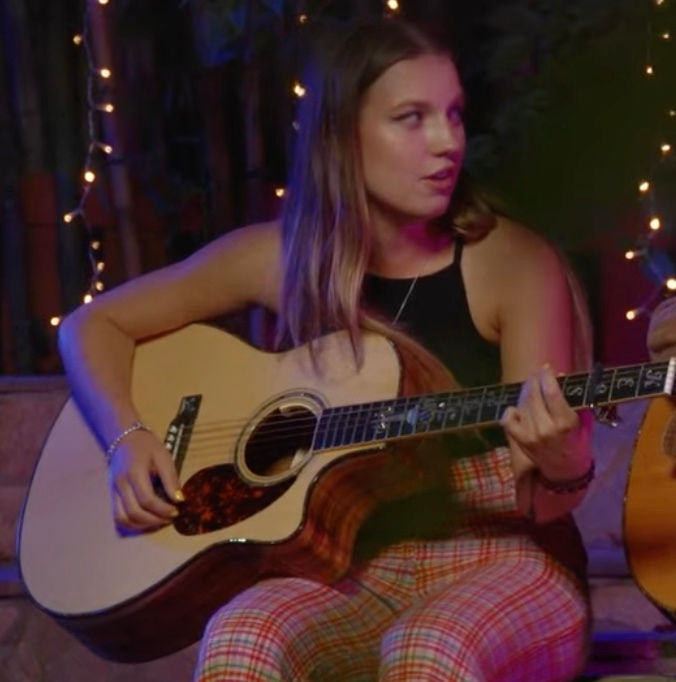
Kelsie Kimberlin’s new single Infinite Possibilities doesn’t kick the door open with a big pop hook or a neon-light chorus. It starts smaller—two Larrivée acoustic guitars, a warm firepit glow, and the kind of unforced harmonies that only happen when two people have been singing together for years. In this case, those two people are Kelsie and her father, trading verses and glances like they’ve been rehearsing for this moment their whole lives. Which, as it turns out, they kind of have.
There’s a lot of polish here—Grammy winners in the mix and mastering chain, a string quartet woven into the arrangement—but the core of the song feels lived-in. It’s about that tipping point between shelter and flight, when you’ve been waiting long enough in your cocoon and the walls finally start to crack. The way Kelsie sings “beautiful and bold” doesn’t feel like a line on paper; it feels like someone convincing herself in real time.
The video, shot by director Zack Gross, leans into quiet symbolism. That firepit isn’t just a nice set piece—it’s the burn-off of whatever you can’t carry forward. And there’s this one camera angle where you see the scene through leaves, almost like you’re sneaking a first look at a life you haven’t stepped into yet. It’s subtle, and maybe a little on-the-nose if you’ve read the press notes, but it works.
Kelsie’s no rookie. She’s written over a hundred songs, pulled millions of streams, and somehow keeps roping Grammy-caliber talent into every release. But Infinite Possibilities isn’t just another notch in a growing discography. It’s a snapshot of where she is now—already proven as a pop artist, but still willing to show the soft, slightly unguarded side. That’s not always the move when you’ve got momentum, but it might be why she’s kept it.
Of course, she’s not just making music in a bubble. This is the same artist who’s been honored by both the United Nations and King Charles for her support of Ukraine, and who’s got a full-length film and tour lined up to push that cause even further. There’s a clear through-line in her work—songs as both personal diary entries and public statements—but Infinite Possibilities feels like the bridge between the two.
One thing you notice listening to Kelsie: she’s a strategist. She knows when to stack harmonies, when to pull back, when to let a lyric land without a wall of sound behind it. And yet there’s always a little unpredictability, like she’s still figuring it out right alongside you. That contradiction—precision with just enough looseness—is what keeps me coming back.
If this song is any indication, 2025 isn’t just going to be about big stages or big numbers for Kelsie Kimberlin. It’s about moments like the one in the video where she looks up from her guitar at her dad, grins mid-line, and keeps playing. You get the sense that even with all the accolades, she’s still chasing that look, that feeling. And honestly? That’s the kind of artist you bet on.
From the Small Print to Center Stage: Ziey Kizzy Steps Into the Light
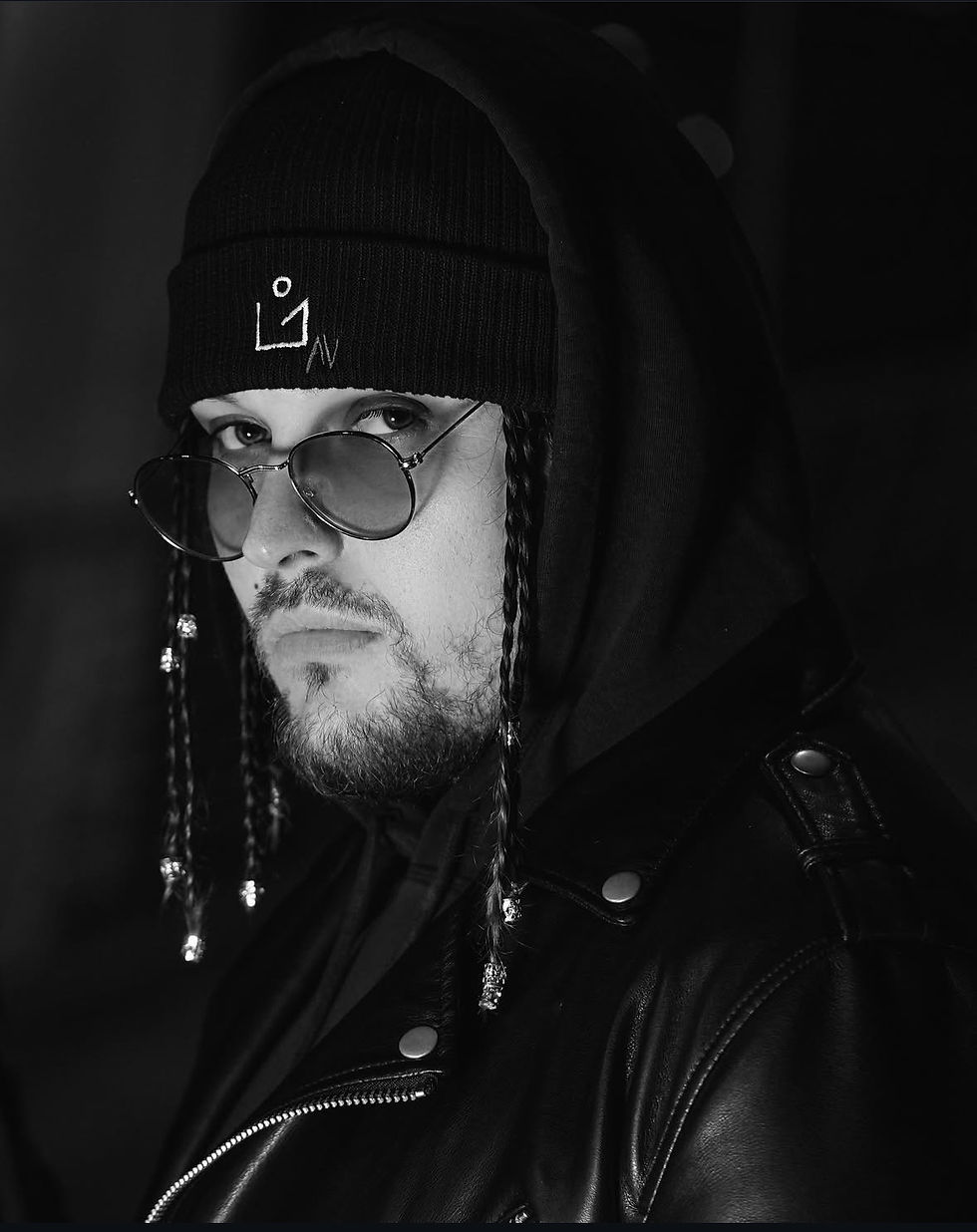
If you only know Ziey Kizzy from the feature credits—engineering for Snoop Dogg, Coi Leray, Kid Bookie—you might assume he’s just another behind-the-scenes studio ghost. The kind of name you spot in the small print if you bother to read the liner notes. But “YOSYS (You’re Ok, So You Say),” dropping July 20, 2025, is Ziey slamming the studio door wide open and stepping right into the spotlight. And the way he’s done it—writing, producing, recording, mixing, shooting the video himself—isn’t just impressive, it’s almost defiant.
The track didn’t come from a carefully scheduled release plan or label brainstorming session. It was born in a moment he barely remembers, during his second stint of being homeless, when the studio he’d built became not just a workplace but a roof over his head. He vented into the mic, hit save, and moved on. Years later, digging through old files, he pressed play and felt that gut punch all over again. No tweaks. No polishing. Just, yeah… that’s real. That’s what you’re getting on “YOSYS.”
And what does it sound like? It’s got that strange, addictive mix of toughness and vulnerability that Ziey has mastered over years of doing absolutely everything himself. There’s a melodic pull that makes it stick in your head, but under it, a restless energy—like he’s holding something back on purpose, just to make you lean in closer. It’s not tidy. It’s not trying to be perfect. It’s trying to be honest. And maybe that’s why it works.
If you’ve followed his journey, you know Ziey’s not some industry plant or viral one-hit hopeful. He started as a rapper in 2006, taught himself to sing, scream, make beats, shoot videos, and engineer records because no one else would help—or maybe because they didn’t want him to outshine them. “They should’ve felt threatened,” he says, half-joking, half-dead serious. Now he owns his own studio, offering those same skills to other artists who are just as stubborn about making it on their own terms.
There’s a line he throws out—“I sing what you’re scared to admit. I wrap pain in velvet, then rip it open”—and it sums him up better than any genre tag. It’s also what makes “YOSYS” feel like more than just another single on the release calendar. This is him putting something private on public display, but without dressing it up to make it easier for you. The video, shot in his own space, is stark. No gimmicks. Just him, the song, and the weight it carries.
And the contradictions are part of the draw. Ziey talks a big game about being “super talented” and not following anyone’s footsteps, but then he’ll casually drop stories about hitting rock bottom so many times he’s lost count. There’s ego, sure, but there’s also survival. You get the sense that quitting, for him, wouldn’t just be a personal failure—it’d feel like letting down the people who’ve been quietly rooting for him all these years.
When “YOSYS” lands, it won’t be wrapped in the usual hype cycle. It’s not aiming for an algorithm spike or a TikTok trend. This is one of those songs you stumble on and immediately text to someone with, you need to hear this. And with Ziey finally putting himself front and center, it feels like we’re just seeing the start of whatever comes next. He’s not waiting for the industry to catch up—he’s already moving.
Balázs Janky Doesn't Just Write Songs—He Builds Worlds
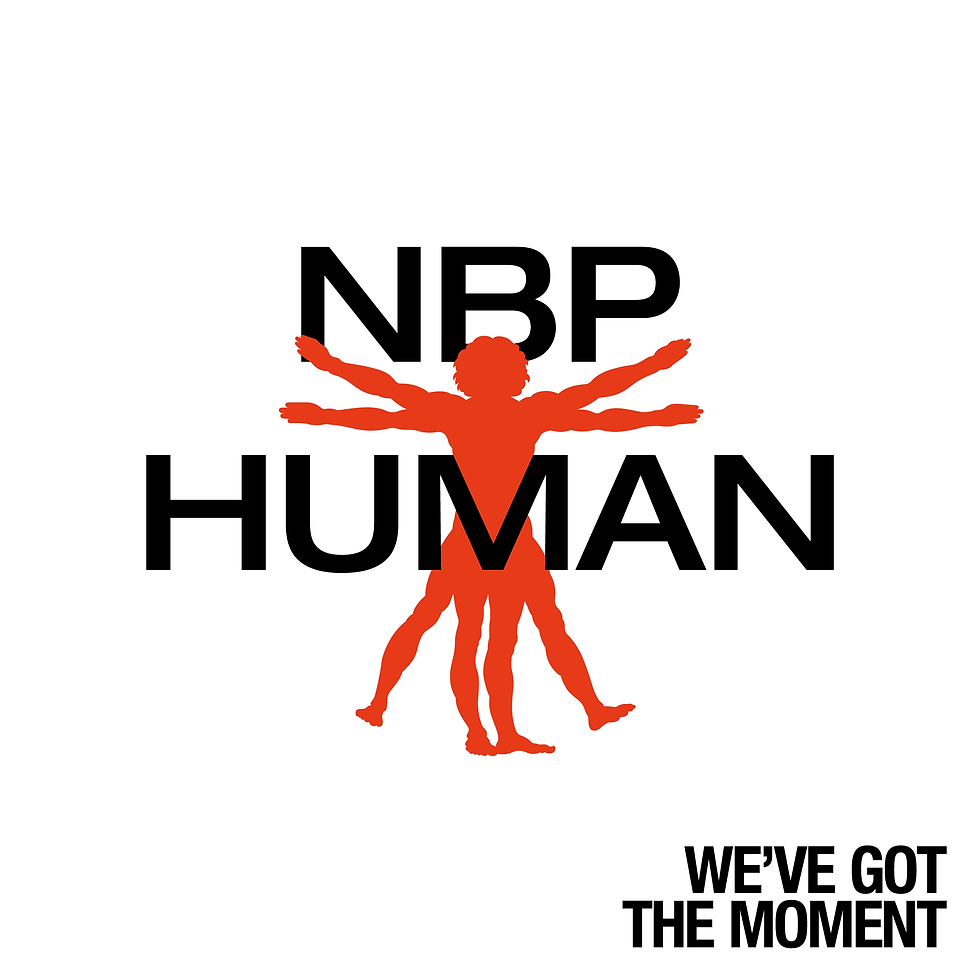
Balázs Janky doesn’t just write songs—he builds worlds. With his project NBP Human, the Hungarian songwriter, guitarist, and vocalist takes the long way around a thought, letting it simmer until it’s more than a lyric, more than a riff. His new single We’ve Got the Moment feels like one of those late-night conversations you don’t want to end—where you’re talking about life, time, and the weird way both speed up when you’re not paying attention. It’s grunge-flavored indie rock, but the kind that isn’t trying to cosplay the ’90s. This is lived-in, road-tested stuff.
The track hits with a looseness that’s clearly intentional—Janky’s not chasing pristine perfection, he’s chasing truth. You hear it in the guitar tone, slightly rough around the edges, like it’s been dragged through too many smoky bars. The vocals don’t sit politely on top of the mix; they lean forward, like they’ve got something urgent to tell you before the song runs out. And then there’s the chorus, the kind of hook that feels both inevitable and surprising. It’s familiar without being predictable—probably why it lingers in your head hours after you’ve heard it.
Balázs has been around the block musically. Back in the ’90s, NBP Human was a garage-style grunge outfit, but then he took a long detour into pop—writing for Hungarian acts, fronting two successful pop bands, even managing high-profile artists. That’s the contradiction that makes him interesting. He knows how to craft a chart-friendly hook, but he’s not afraid to throw commercial polish out the window if it gets in the way of the song’s heartbeat. This return to NBP Human isn’t some nostalgic throwback; it’s a reset button.
The We’ve Got the Moment video—directed and edited by Janky himself—makes the song’s concept hit harder. It’s basically a life in snapshots: kids running, teenagers laughing too loud, couples dancing at weddings, old hands gripping coffee mugs. No fake cinematic drama, just the kind of images that make you feel something because you’ve been there. It’s not glossy, and that’s why it works. It feels like scrolling through someone else’s memories and accidentally finding your own.
This is the third single NBP Human has dropped in 2025, following Morbid Craziness and The Fundaments, the latter getting spins on radio stations from Portugal to Australia. The consistency isn’t just about productivity—it’s about building a body of work that tells a bigger story. You can feel the throughline: sharp, poetic observations about being human, wrapped in guitar-driven arrangements that flirt with grunge, indie, and classic rock. If Chris Rea, Nirvana, and Dire Straits could somehow share a rehearsal space, it might sound a bit like this.
Balázs records everything in his home studio, playing all the instruments himself. No fancy tricks, no session players. Just one guy layering parts until they feel right. It’s DIY in the purest sense, but you can tell there’s decades of experience under the hood. The mix and master come courtesy of Hungarian sound engineer Zsolt Gyulai, who manages to keep things punchy without sanding off the edges that give the track personality.
Next year, Janky plans to take NBP Human back onstage with a full band. You get the sense that We’ve Got the Moment is just the start of a bigger push—a statement that after years of writing for others, he’s got something personal to say, and he’s saying it loud enough for anyone listening to catch it. Whether you’re here for the grunge bite, the indie warmth, or just the way the lyrics sneak up on you, now’s a good time to lean in.
The Party They're Still Throwing Anyway
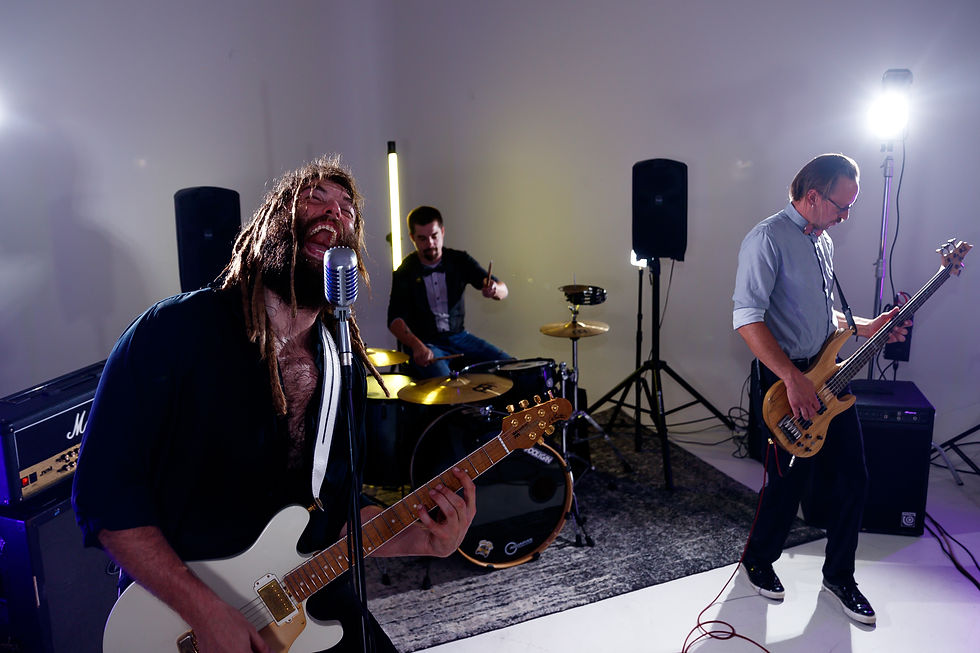
The first thing you notice about Dopamine Machine isn’t the title—it’s the attitude. The Party After aren’t here to court the industry with polite radio singles. This debut full-length sounds like it’s been simmering in a back room for over a decade (because, well, it has). Some of these songs first sparked to life as early as 2011, but instead of sounding dated, they feel like they’ve been sharpened with every trial, every lineup shakeup, every bad management call, every stolen piece of gear. It’s the kind of record that could only be made by three friends who’ve been through the wringer together and somehow came out grinning.
Frontman Jared William Gottberg isn’t short on commitments—he juggles a solo career, a duo, and a five-piece band, clocking over 200 shows a year across the Midwest. But when the “bigger stages” call, The Party After answers. Alongside drummer Derek Talburt and bassist Tony Bates, Jared channels a sound they jokingly (and accurately) call dystopian party rock: gritty alt-rock riffs with flashes of blues, spacey textures, and lyrical themes that peek behind the curtain of fame’s supposed glamour. Think Pink Floyd jamming with Deftones at a house party where 311 and Ghost are also on the guest list.
The journey here wasn’t pretty. In 2015, they were robbed on tour in San Antonio. Not long after, a past member hit them with a cease-and-desist over their band name. Management blunders came and went. Lesser bands might’ve packed it in, but The Party After doubled down, stripped back to a trio, and slowly carved out their identity. By 2018 they were releasing singles, and by late 2021, they were in Mexico City’s Topetitud Studios—part-owned by Molotov’s Tito Fuentes—laying down the tracks for Dopamine Machine with producer David Montuy Robles. The location mattered. Being away from Nebraska, thrown into one of the biggest cities in the world, lit a different kind of creative fire.
The result? A record that swings between cynicism and camaraderie. Lead single “Blast Off” drips with the paranoia and grind of chasing a dream that never seems to catch up to you, while “One For All” flips the lens, championing unity and the absurd joy of sticking together in the chaos. And then there’s “Celebrating Nothing,” the closing track, where Jared sings, I know you’re tired now. Soon, you’ll sleep, somehow. Just one more show to go... then you’ll get to be back home. It’s the kind of line that makes sense only if you’ve lived the grind yourself.
Their branding—playful, oddball animated characters—sits in stark contrast to the darker themes in their music. It’s a contradiction they lean into, almost like they’re daring you to underestimate them. Offstage, they’re the guys cracking jokes in the green room; onstage, they’re a wall of sound and sweat. That balance makes them hard to pin down, which might be why they’ve been able to open for everyone from Hinder to Smile Empty Soul without sounding out of place.
When I ask what’s next, they don’t hesitate. The sophomore album is already half-written. Another international recording session is in the cards. More shows, more miles, more late-night drives back from gigs where you can’t quite remember the last time you had a weekend off. It’s not glamorous—but The Party After doesn’t really care about that.
And that’s maybe why Dopamine Machine works so well. It’s not a “debut” in the sense of a fresh start; it’s a victory lap for surviving the mess that most bands don’t. These guys have been knocked down enough times to know the floor well. Now they’re inviting you to the party they’re still throwing anyway. You can either show up or stay home—but they’re not slowing down for you.
Sticky Air and Brass Sections: Tyler Kinchen's Gulf Sound

It’s hard not to grin the first time “Lovin’ Man” hits your speakers. There’s a swagger in the horns, a sly bounce in the bassline, and Tyler Kinchen’s voice—smooth as fresh café au lait—slides right in like it’s been soundtracking your summers for years. It’s the sort of track that makes you forget what you were doing and reach for someone’s hand, if only to spin them once before the chorus lands.
Kinchen and his crew, The Right Pieces, aren’t playing dress-up with retro influences. This is Southeast Louisiana in stereo: sticky air, crowded porches, brass sections that know how to talk without saying a word. The groove here feels lived-in, not studied—like it came out of late-night jam sessions that ended when someone’s grandma flipped the porch light off and told everyone to go home.
What’s refreshing is the balance between polish and play. “Lovin’ Man” has that tight, radio-ready production, sure, but it still leaves space for the music to breathe. The horn stabs aren’t overstuffed; the rhythm section keeps it loose enough to dance to without feeling locked to a grid. You can almost hear the grin in Kinchen’s delivery—he’s selling the romance, but he’s in on the joke too.
There’s a through-line in their story that’s easy to miss if you only catch the single. These guys have been grinding in the Gulf circuit, building a reputation off sweat-drenched live sets that blur the line between concert and block party. The new release feels less like a pivot and more like a statement: we’ve been here, and now you’re paying attention.
Kinchen himself is a bit of a contradiction. Offstage, he’s measured and grounded, talking about connection and commitment with the weight of someone twice his age. Onstage, he’s all movement and lightness, pacing the edge of the stage like a man making sure every corner of the room gets their fair share of the groove. He says “Lovin’ Man” is about showing up fully for someone, but you get the sense he’s also talking about showing up fully for the music.
The band’s sound pulls from all over—Anderson .Paak’s sly funk, Leon Bridges’ warm soul, a touch of St. Paul & The Broken Bones’ bombast—but it doesn’t feel stitched together. It’s more like they’ve been carrying these influences around in their back pockets for years, and this is just how it comes out when they plug in and play. That’s probably why it works live and in the studio without losing the spark.
With “Lovin’ Man” dropping alongside a run of Southern dates and a music video that doubles down on the track’s charm, Tyler Kinchen & The Right Pieces are clearly setting the table for something bigger. The momentum feels real—not hyped-up press kit real, but the kind of buzz that comes when people start texting their friends after a set: you need to hear this. And if the groove keeps hitting like this, they won’t be just a regional secret for much longer.
Pedaling Alongside You: Dan Whitehouse & Jasmine Gardosi
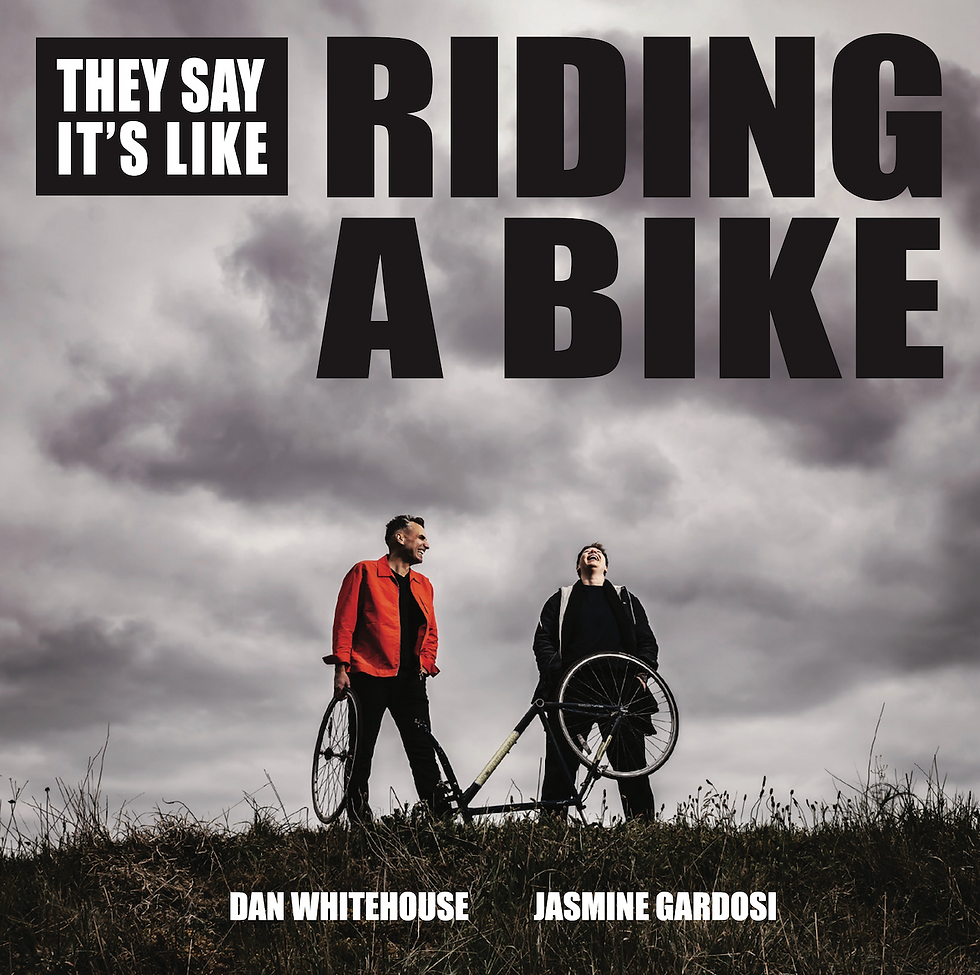
Dan Whitehouse’s new track with Jasmine Gardosi doesn’t just talk about resilience—it actually sounds like it. Not in some vague, motivational-poster way, but in the click of a bike chain, the ring of a bell, the gentle hiss of breath between beatbox kicks. “(They Say It’s Like) Riding A Bike” is built on real bicycle sounds, chopped and layered over jazz-hop grooves that feel equal parts laid-back and quietly determined. It’s music you could ride to, sure—but also music that nudges you forward when you’d rather just stop.
The origin story is refreshingly unpretentious. In 2024, the two co-led Black Country Bikes: Music In Motion, a community project pulling together cyclists, poets, first-time songwriters, and whoever else was curious enough to wander in. They asked a simple question: “What does it feel like to ride a bike?” People answered in stories, in movement, in half-sung lines. Someone hit the frame with a stick. Someone else spun the wheel just to hear it hum. Those little moments didn’t just inspire the track—they are the track.
Whitehouse, usually known for his soul-bare folk and ambient explorations, leans here into something looser, more playful, without losing his knack for distilling big feelings into small details. Gardosi, a multiple slam champion and former Birmingham Poet Laureate, threads her spoken word and beatboxing into the mix like she’s been doing this exact thing for years. Together, they’ve made something that’s neither strictly song nor poem—more like an overheard conversation you can dance to.
What’s clever is how the metaphor never gets heavy-handed. Yes, it’s about falling and getting back up. About mental health and wobbling through the rough bits. But it’s also just about… riding a bike. The body remembers. The hands find the bars again. You go. That duality—ordinary action and emotional truth layered in the same breath—is what keeps me hitting replay. It’s the sort of track that doesn’t demand you pay attention, but rewards you when you do.
There’s a warmth in the way they talk about it, too. Gardosi says the song is “powered by breath”—both literally, through her beatboxing, and metaphorically, in those pauses where you gather yourself before pushing forward. Whitehouse adds, “It’s OK to fall off… what matters is getting back on, even if the wheels feel wobbly.” It’s the kind of offhand wisdom that lands harder because it isn’t dressed up.
Industry-wise, it’s a smart move. Lo-fi and jazz-hop fans will hear echoes of Sleepy Fish or Digable Planets, but there’s an unmistakable fingerprint here. Dropping it to coincide with National Cycle to Work Day is a neat hook—one of those small marketing details that’ll stick in a press blurb and make sense to festival bookers down the line. But beyond that, the track feels like the first page of a longer collaboration. You can tell they’re not done yet.
If this is the starting point—two artists coming from different worlds, meeting in a workshop, and making something that’s equal parts inventive and unassuming—I’m curious where they go next. Maybe another bike ride. Maybe something completely different. Either way, “(They Say It’s Like) Riding A Bike” feels like the sort of song that won’t just sit in your playlist. It’ll pedal alongside you for a while, quietly keeping pace.
Before the Headlines: Voreignn's "Jokes on you"

The first thing you notice about Jokes on you isn’t the polish — it’s the way it feels like you’ve been dropped right into the middle of someone’s real life, mid-thought, mid-breath. Voreignn didn’t just make this record in a studio; he made it in the sunroom of his producer 2 Tone’s apartment, where the light comes in a little too strong and the walls probably weren’t meant for soundproofing. Seventy percent of it was freestyled. Not in a “let’s jam and see what happens” kind of way — more like he stepped into the booth and built a world in real time, no safety net.
Voreignn’s been grinding for nine years, but Jokes on you feels like a debut in the truest sense — the moment you hear someone who’s finally locked in on exactly what they want to say. His voice swings between melodic hooks and verses that don’t wait for you to catch up. There’s a confidence here that doesn’t come from an easy path. He’s been homeless. He’s bounced from state to state. His family’s history with mental illness meant chaos was never far away. That’s the kind of background you can’t fake in your writing — it seeps into the rhythm, the pacing, the way he throws a line away like it’s no big deal when you know it’s actually everything.
When he says, “Jokes on you because when I told them I was a star, there was no hope in me,” it doesn’t sound like a clever hook. It sounds like a dare. Like the kind of thing you say when you’ve been underestimated so many times, you’ve learned to turn it into fuel. There’s no namedropping of influences because, honestly, he’s not chasing anyone’s blueprint. The hunger came back, and this time it’s personal — for his late mother, for himself, for the version of him that never quit even when the odds said otherwise.
What’s wild is how Jokes on you manages to be both unpredictable and cohesive. You can hear 2 Tone’s fingerprints on more than half the beats — they’re textured but not overcomplicated, giving Voreignn the room to stretch. One track will lean into a melodic pocket, the next flips into something harder without losing the throughline. It’s not “genre-bending” in the buzzword sense. It’s more like someone who’s lived through enough phases of life to know you can’t stay in one lane forever.
There’s no rollout of big shows or flashy collabs to sell you on here. He’s not pushing tour dates or trying to frame this as some massive industry moment. That’s probably what makes it land harder. You hear it and you get the sense this project exists because it had to — because there were too many things left unsaid, and he finally had the right space and the right mindset to get them out. Sometimes that’s the whole marketing plan: make something so undeniable people have no choice but to pay attention.
The Milwaukee scene has been producing some interesting names lately, but Voreignn doesn’t seem too concerned with fitting into any wave. His lane is narrow, specific, and entirely his. He talks about Jokes on you being “different than anyone I’ve ever heard,” and you believe him — not because he’s reinventing music, but because he’s clearly reinvented himself. That kind of self-assuredness is rare in a debut.
So, here’s the play: don’t wait for some algorithm to shove this onto your playlist six months from now. Go find Jokes on you while it’s still buzzing under the surface. It’s one of those projects that feels like you’re catching it early — before the headlines, before the features, before everybody starts acting like they’ve been here since day one. And when that happens? You can say, “Yeah, jokes on you. I already knew.”
Ferdinand Rennie Finds the Right Wind
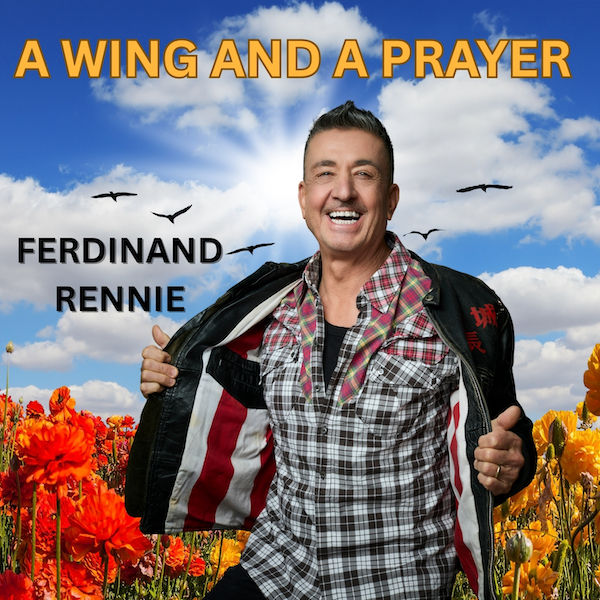
Ferdinand Rennie doesn’t just sing a song—he builds it like a cathedral, piece by piece, until the roof lifts clean off. His latest track, A Wing and a Prayer, proves it. Co-written with Andrew Littlewood and produced alongside German heavyweight Alan Vukelic and Scottish musician Dan Healey, it’s the kind of pop ballad that feels like it’s already been in your life for years, waiting for the right moment to show up. From the first note, his voice cuts through—rich, polished, but carrying that slight grain that keeps it human.
I first heard it late at night with headphones on, which might’ve been a mistake. There’s something about Rennie’s delivery that doesn’t just fill your ears; it hangs around in your chest. The production is clean but not sterile, leaving space for his phrasing to lean into certain words like he’s letting you in on something. You get the sense he knows how to land a line—not just from recording studios, but from years on stage in musicals like Les Misérables and Beauty and the Beast. Those theatre instincts don’t fade.
Rennie’s story isn’t the typical bedroom-pop-to-Spotify playlist arc. Born in Austria, based in Scotland’s west coast, he’s been putting in the miles—literally. He’s sung for royalty in Monte Carlo (Prince Albert and Princess Charlene, no less), held his own on Britain’s Got Talent, and toured alongside Eurovision winner Vicky Leandros. His résumé swings from TV spots in Austria and Germany to charity galas and global radio play. There’s a craftsman quality to it all. He’s not chasing trends; he’s chasing songs that last.
And the man’s got range—in every sense. A Wing and a Prayer sits comfortably alongside his past work: his heartfelt take on Snow Patrol’s Run, his soaring Never Enough from The Greatest Showman, and more recently, Unbelieving Eyes, a ballad penned for him by a small army of hitmakers including Sharon Vaughn and Jeff Franzel. Each track feels like a chapter, but none of them are trying to be the “defining” one. That’s part of what keeps listeners hooked—you don’t feel like you’ve heard the final word from him yet.
There’s also a bit of contradiction baked into Rennie’s appeal. On stage, he’s every inch the leading man—commanding, poised, vocally bulletproof. But in interviews and between takes, he comes across almost disarmingly unhurried. He talks about songs like he’s describing an old friend, not a trophy. That calmness bleeds into his music, even in the big emotional peaks. It’s less about showing you what he can do, more about making sure you feel it too.
What I like about A Wing and a Prayer is that it’s not just a “showpiece” song. Sure, it lets him flex his vocal power, but it also gives you an emotional anchor—something about perseverance without turning into a cliché. The kind of track that could play over the credits of a film and make you stay seated just to hear it through. It’s music that assumes you’re paying attention, which is rare these days.
And Rennie’s already moving forward. With Grammy-winning producers in his corner and a catalog that’s as comfortable on radio as it is in a theatre, it feels like he’s in one of those inflection-point moments. He’s been at this long enough to know the grind, but there’s a spark in A Wing and a Prayer that suggests he’s not coasting. If anything, he’s just now finding the right wind to carry him further. And I’ve got a feeling this isn’t the last time we’ll be talking about him.





Comments